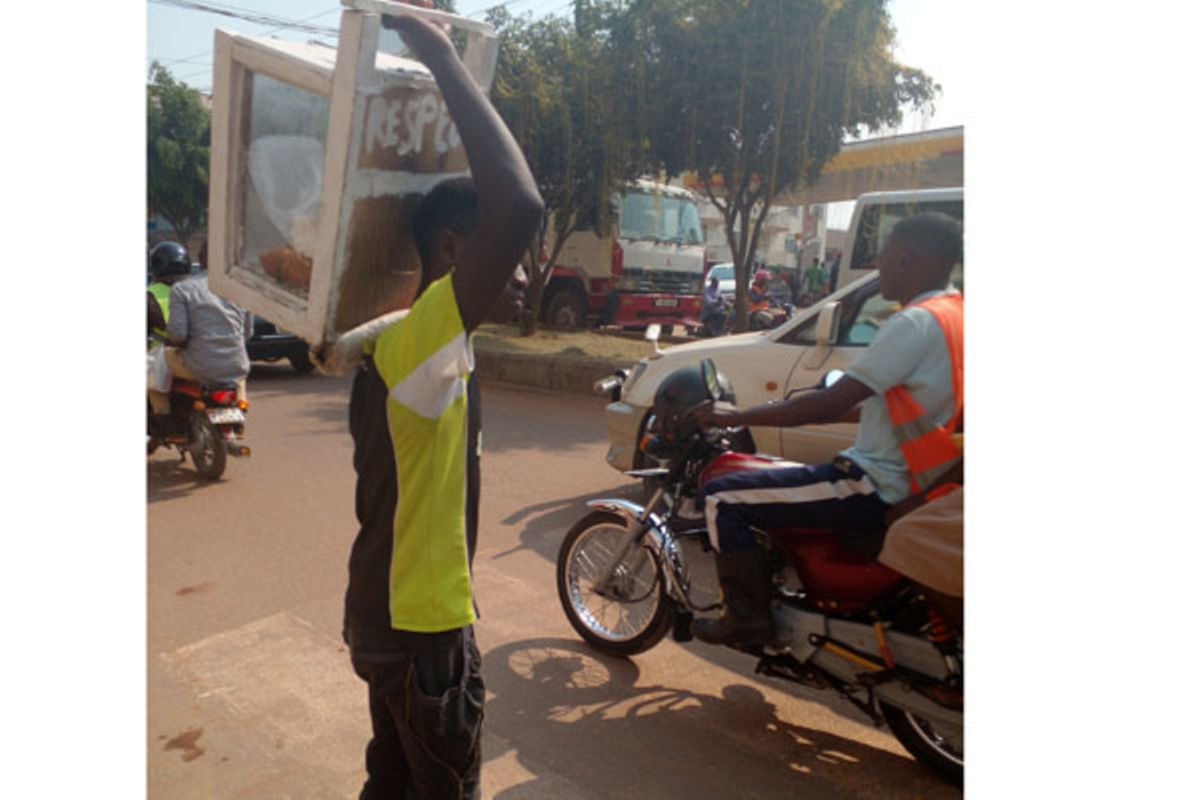How parents have exposed children to abuse on Mbarara streets – Monitor
A child carries a box of snacks to sell in Mbarara City on January 9, 2023. PHOTO | RAJAB MUKOMBOZI
By Rajab Mukombozi
Correspondent
Daily Monitor
Parents in Mbarara District are sending children to sell commodities on the streets to earn a living.
Some of the parents, who spoke to Daily Monitor say they are unable to meet some of the basic needs for the children including school fees and food, which is why they have resorted to sending the children on the streets.
The children sell a variety of commodities including fruits, steamed and roasted maize, pancakes, roasted ground nuts, and boiled eggs.
Ms Judith Natukunda, a resident of Biafra in Mbarara City, says she is unable to raise fees for her children, which is why she sent them to the streets.
Ms Natukunda says the children encounter a number of challenges on the streets.
“Sometimes law enforcement officers beat them up and take their money and merchandise,” she said, adding, “My daughter was kidnapped one time by a woman who claimed she would give her a good job and educate her but lucky enough, a relative recognised her and she was rescued.”
Ms Edrinah Mbabazi, another parent, says she is struggling to get her 14-year-old son off the streets.
“I introduced my two children to vending because I could not afford to keep them in school. I was also struggling to buy food and pay rent,” Ms Mbabazi says, adding: “Last year, the eldest refused to return home after joining a group of street children.”
Other challenges the children face include accidents and sexual abuse but say they bear with the challenges because they are afraid to go home empty-handed.
Blair Musiime, 12, a Primary Five pupil of Kakiika Integrated Primary School in Mbarara City, says: “My parents told me I must find school fees if I am to return to school. I have been saving every holiday.”
Musiime told Daily Monitor that he works with two of his siblings.
“One time my sister got lost. We found her after two days in Ruti (about four kilometres away),” he narrates.
Daphine Ainembabazi, 13, a Primary Five Pupil at Sky Junior Primary School in Mbarara City, says: “If you want to sell, you cannot avoid sexual harassment, bad touches, verbal abuse and insults. A customer will call you and start touching your body. If you turn him down, he will not buy from you. That is why some of the children dance to the tunes of abusers because they want to sell.”
She further revealed that some of her colleagues have been sexually abused.
“Some parents don’t understand this. They are only happy when they see you with money but are not interested in how you have suffered to get it,” Ainembabazi says.
Mr Edwin Musiime, a social worker, says: “Most of these children vendors are in the trade because they are being forced by parents or guardians and because of this, they easily bend to the pressures from the abusers to satisfy their parent’s demands of generating income for the family.”
Ms Evelyne Walimbwa, another social worker and a human rights defender in Mbarara, says: “Whether it’s because of the prevailing economic hardships, parents should not risk their children’s lives. It’s not only because of the coronavirus pandemic but these children risk being sexually abused or recruited in criminal gangs.”
The secretary for community affairs at Mbarara City Council, Mr Abasi Kazibwe, says they have been sensitising parents against sending children to sell products on the streets.
“You are seeing the increasing number of street children but they are from within. Some of these start as street vendors, get used to money and start mingling with fellow street children,” he says.
The Rwizi region police spokesperson, Mr Samson Kasasira, says the practice is not only unlawful but puts children’s lives at risk.
“We are going to work with city authorities and arrest parents of children found vending on streets,” he warns.
The law
The National Labour Law prohibits the involvement of children below 13 in any employment except for light work carried out under the supervision of an adult that does not affect the child’s education.
According to International Labour Organisation (ILO), Child labour is a violation of fundamental human rights and has been shown to hinder children’s development, potentially leading to lifelong physical or psychological damage.
Uganda signed and ratified the United Nations Convention on Rights of the Child (UNCRC) and Article 32 states that children should be protected from economic exploitation and from performing work that is likely to be hazardous or interfere with the child’s education or be harmful to the child’s health or physical, mental, spiritual, moral and social development.
We come to you. We are always looking for ways to improve our stories. Let us know what you liked and what we can improve on.
Mao say the Democratic Party believes in working together to bring change
The declaration was confirmed by the World Health Organization (WHO)
MPs argue that KCCA should be reconstructing the roads since funding was provided by government
If you have an Ad-blocker please disable it and reload the page or try again later.
Welcome!










